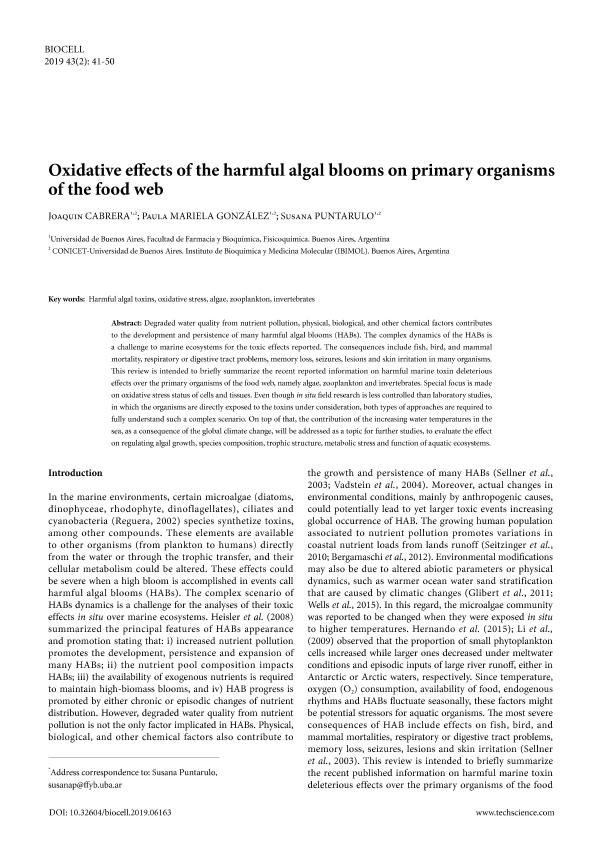Mostrar el registro sencillo del ítem
dc.contributor.author
Cabrera, Joaquin

dc.contributor.author
González, Paula Mariela

dc.contributor.author
Puntarulo, Susana Ángela

dc.date.available
2021-01-19T12:56:56Z
dc.date.issued
2019-06
dc.identifier.citation
Cabrera, Joaquin; González, Paula Mariela; Puntarulo, Susana Ángela; Oxidative effects of the harmful algal blooms on primary organisms of the food web; Instituto de Histología y Embriología; Biocell; 43; 2; 6-2019; 41-50
dc.identifier.uri
http://hdl.handle.net/11336/123005
dc.description.abstract
Degraded water quality from nutrient pollution, physical, biological, and other chemical factors contributes to the development and persistence of many harmful algal blooms (HABs). The complex dynamics of the HABs is a challenge to marine ecosystems for the toxic effects reported. The consequences include fish, bird, and mammal mortality, respiratory or digestive tract problems, memory loss, seizures, lesions and skin irritation in many organisms. This review is intended to briefly summarize the recent reported information on harmful marine toxin deleterious effects over the primary organisms of the food web, namely algae, zooplankton and invertebrates. Special focus is made on oxidative stress status of cells and tissues. Even though in situ field research is less controlled than laboratory studies, in which the organisms are directly exposed to the toxins under consideration, both types of approaches are required to fully understand such a complex scenario. On top of that, the contribution of the increasing water temperatures in thesea, as a consequence of the global climate change, will be addressed as a topic for further studies, to evaluate the effect on regulating algal growth, species composition, trophic structure, metabolic stress and function of aquatic ecosystems.
dc.format
application/pdf
dc.language.iso
eng
dc.publisher
Instituto de Histología y Embriología

dc.rights
info:eu-repo/semantics/openAccess
dc.rights.uri
https://creativecommons.org/licenses/by-nc-sa/2.5/ar/
dc.subject
ALGAE
dc.subject
HARMFUL ALGAL TOXINS
dc.subject
INVERTEBRATES
dc.subject
OXIDATIVE STRESS
dc.subject
ZOOPLANKTON
dc.subject.classification
Biofísica

dc.subject.classification
Ciencias Biológicas

dc.subject.classification
CIENCIAS NATURALES Y EXACTAS

dc.title
Oxidative effects of the harmful algal blooms on primary organisms of the food web
dc.type
info:eu-repo/semantics/article
dc.type
info:ar-repo/semantics/artículo
dc.type
info:eu-repo/semantics/publishedVersion
dc.date.updated
2020-11-06T20:28:58Z
dc.identifier.eissn
1667-5746
dc.journal.volume
43
dc.journal.number
2
dc.journal.pagination
41-50
dc.journal.pais
Argentina

dc.description.fil
Fil: Cabrera, Joaquin. Consejo Nacional de Investigaciones Científicas y Técnicas. Oficina de Coordinación Administrativa Houssay. Instituto de Bioquímica y Medicina Molecular. Universidad de Buenos Aires. Facultad Medicina. Instituto de Bioquímica y Medicina Molecular; Argentina
dc.description.fil
Fil: González, Paula Mariela. Consejo Nacional de Investigaciones Científicas y Técnicas. Oficina de Coordinación Administrativa Houssay. Instituto de Bioquímica y Medicina Molecular. Universidad de Buenos Aires. Facultad Medicina. Instituto de Bioquímica y Medicina Molecular; Argentina
dc.description.fil
Fil: Puntarulo, Susana Ángela. Consejo Nacional de Investigaciones Científicas y Técnicas. Oficina de Coordinación Administrativa Houssay. Instituto de Bioquímica y Medicina Molecular. Universidad de Buenos Aires. Facultad Medicina. Instituto de Bioquímica y Medicina Molecular; Argentina
dc.journal.title
Biocell
dc.relation.alternativeid
info:eu-repo/semantics/altIdentifier/url/https://www.techscience.com/biocell/v43n2/33374
dc.relation.alternativeid
info:eu-repo/semantics/altIdentifier/doi/http://dx.doi.org/10.32604/biocell.2019.06163
Archivos asociados
